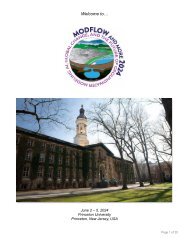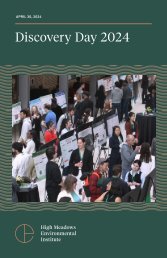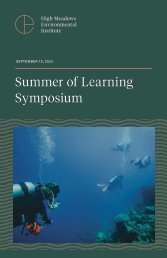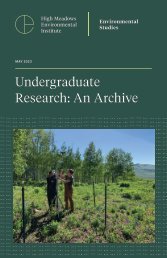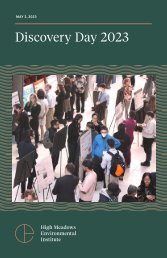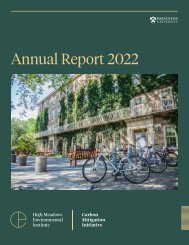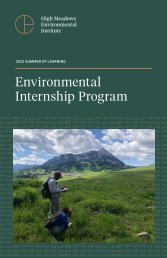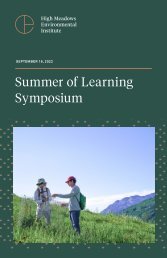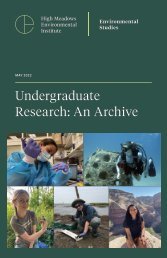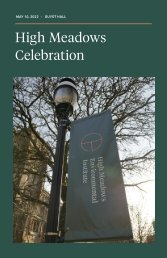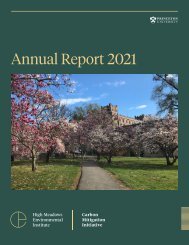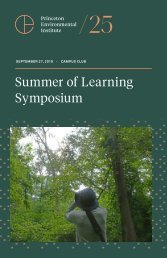Environmental Internship Program - 2023 Booklet
You also want an ePaper? Increase the reach of your titles
YUMPU automatically turns print PDFs into web optimized ePapers that Google loves.
PROJECT TITLE<br />
Climate-change Mediated<br />
Evolutionary Shifts in a<br />
High-alpine Hibernating<br />
Mammal<br />
ORGANIZATION(S)<br />
vonHoldt Lab,<br />
Department of Ecology<br />
and Evolutionary Biology,<br />
Princeton University<br />
LOCATION(S)<br />
Rocky Mountain<br />
Biological Laboratory,<br />
Gothic, Colorado<br />
MENTOR(S)<br />
Bridgett vonHoldt,<br />
Associate Professor of<br />
Ecology and Evolutionary<br />
Biology, Princeton<br />
University; Daniel<br />
Blumstein, Professor,<br />
Department of Ecology<br />
and Evolutionary Biology,<br />
University of California,<br />
Los Angeles; Stavi<br />
Tennenbaum, Ph.D.<br />
candidate, Ecology and<br />
Evolutionary Biology,<br />
Princeton University<br />
Emma Demefack ’26<br />
ECOLOGY AND EVOLUTIONARY BIOLOGY<br />
I worked as a field technician and research<br />
assistant on the Marmot Project, a historic study<br />
that began in 1962 and is one of the world’s<br />
longest-running studies of mammals in the wild.<br />
At the Rocky Mountain Biological Laboratory in<br />
Gothic, Colorado, I worked alongside a highenergy<br />
field team of undergraduates, graduate<br />
students and postdoctoral researchers. My<br />
day-to-day responsibilities included taking<br />
behavioral observations, trapping and handling<br />
live animals, collecting biological samples such<br />
as blood and feces, performing timed running<br />
trials, taking morphological measurements,<br />
processing samples and managing our database.<br />
Additionally, I collected data to study the<br />
genomic responses of hibernating marmots<br />
to climate changes in high-alpine meadows<br />
in the Rocky Mountains. This meant focusing<br />
on drawing blood and preserving the blood’s<br />
RNA. Although the fieldwork was challenging,<br />
I ultimately found it very rewarding. I learned<br />
valuable technical fieldwork skills and a<br />
better understanding of high-alpine ecology,<br />
specifically within mammals. As a result, I<br />
now have a deeper curiosity about studying the<br />
evolutionary biology of other animals.<br />
BIODIVERSITY AND<br />
CONSERVATION<br />
9




